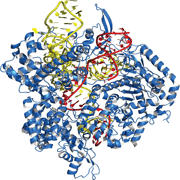Cas9 antibodies

Takara Bio offers both monoclonal and polyclonal antibodies raised against recombinant Cas9 protein from Streptococcus pyogenes.
The Guide-it Cas9 Monoclonal Antibody (Clone TG8C1) is a mouse antibody produced by hybridoma cells against full-length recombinant Cas9 protein from Streptococcus pyogenes. This antibody can recognize less than 1 ng of wild-type Cas9 in bacterial and mammalian cell lysates by Western blot.
Takara Bio offers both monoclonal and polyclonal antibodies raised against recombinant Cas9 protein from Streptococcus pyogenes.
The Guide-it Cas9 Monoclonal Antibody (Clone TG8C1) is a mouse antibody produced by hybridoma cells against full-length recombinant Cas9 protein from Streptococcus pyogenes. This antibody can recognize less than 1 ng of wild-type Cas9 in bacterial and mammalian cell lysates by Western blot.
The Guide-it Cas9 Polyclonal Antibody is a rabbit antibody raised against recombinant Cas9 protein from Streptococcus pyogenes. This antibody recognizes three variants of the Cas9 nuclease: wild-type Cas9, the Cas9 nickase, and Cas9 nuclease-deficient mutants. The antibody is specific and sensitive, no background expression is detected in most mammalian cell lines, and the antibody can recognize as little as 0.5 ng of recombinant Cas9 by Western blot.
Overview
- Choice of a monoclonal or polyclonal antibody raised against recombinant Cas9 protein
- Polyclonal antibody recognizes wild-type Cas9 and nickase variants (not yet tested for monoclonal antibody)
- High specificity: virtually no background signal from mammalian cell lysates
- High sensitivity: Both antibodies can detect less than 1 ng of Cas9 (monoclonal antibody data, polyclonal antibody data)
More Information
Applications
- Western blot detection of Cas9 protein
- Immunocytochemistry detection of Cas9 protein
Components
- Guide-it Cas9 Monoclonal Antibody (Clone TG8C1)
- Cat. # 632628: 100 µg Guide-it Cas9 Monoclonal Antibody (Clone TG8C1) (1 µg/µl)
- Cat. # 632627: 3 x 100 µg Guide-it Cas9 Monoclonal Antibody (Clone TG8C1) (1 µg/µl)
- Guide-it Cas9 Polyclonal Antibody
- Cat. # 632607: 100 µl Cas9 Polyclonal Antibody
- Cat. # 632606: 3 x 100 µl Cas9 Polyclonal Antibody
Additional product information
Please see the product's Certificate of Analysis for information about storage conditions, product components, and technical specifications. Please see the Kit Components List to determine kit components. Certificates of Analysis and Kit Components Lists are located under the Documents tab.
Takara Bio USA, Inc.
United States/Canada: +1.800.662.2566 • Asia Pacific: +1.650.919.7300 • Europe: +33.(0)1.3904.6880 • Japan: +81.(0)77.565.6999
FOR RESEARCH USE ONLY. NOT FOR USE IN DIAGNOSTIC PROCEDURES. © 2025 Takara Bio Inc. All Rights Reserved. All trademarks are the property of Takara Bio Inc. or its affiliate(s) in the U.S. and/or other countries or their respective owners. Certain trademarks may not be registered in all jurisdictions. Additional product, intellectual property, and restricted use information is available at takarabio.com.




